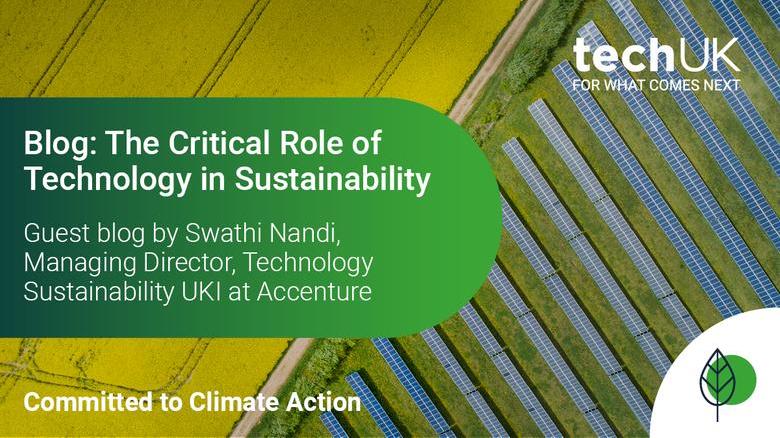The Critical Role of Technology in Sustainability (Guest blog by Accenture)

At COP26 2021, businesses were asked for the first time to participate in the design and implementation of plans to help cap the planet’s temperature rise to 1.5 degrees. This introduced a new phase in the fight against climate change, where businesses alongside governments and civil society were engaged. It is worthwhile thinking about how Technology and business intersect with sustainability in this era. Perhaps we can think about it in the two ways I’ve framed below.
- The sustainability of technology itself- here the focus is on the carbon footprint of IT and digital systems themselves.
All organisations are digital businesses, utilising technology in various ways from e-commerce, to data analysis. With potentially vast IT systems, organisations are being challenged to turn inwards to address their role in mitigating climate change. What is the carbon footprint associated with running data centres, processing data for analytics, the always-on user devices? What changes can they make to reduce the carbon footprint of their IT estate?
CIOs are constantly striving to run their IT projects more efficiently and economically, to deliver the best bang for their buck. But how can they start measuring and implementing KPIs around sustainability in every IT project? How do they structure their teams to embed sustainable behaviours from the code they use, to how they program, what they move to the cloud and how they architect their IT systems?
Recent research found that all ICT systems in the world contribute to 4% of all greenhouse gases emitted*. Global aviation, by comparison contributes approximately 2.5-3%. On our current trajectory, ICT will contribute to 15% of all GHGs by 2040. Tackling this footprint is hugely important in fighting climate change, but with time it will only become more critical.
- Technology as an enabler for Sustainability
Organisations are looking to make fundamental changes to their operations, procurement and reporting in response to the changing demands from customers, investors and regulators. Increasingly, as organisations grapple with these new requirements, they will need technology to help them implement, track and successfully deliver their transformation.
3 key areas where deploying fit-for-purpose technology can help organisations make a step change with regard to sustainability are:
- Reporting. Many industries are now regulated for ESG measures, meaning companies must report on their Scope 1, 2 and 3 emissions**. This can be a complex set of data to capture, record and report on. Understandably this has been a significant area of focus for many product companies like Microsoft, Salesforce, SAP etc. and their offerings in the market are increasingly mature.
- Procurement. For most organisations not in Heavy industries, their largest contributor to emissions come from Scope 3 emissions, i.e., from their vendors, suppliers and indeed consumers. Identifying ways to track and measure an organisations’ Scope 3 emissions is a challenge requiring investment in procurement, vendor management and related technology.
- E-waste. Electronic devices are used extensively across almost all businesses daily. Organisations need to focus on building a strategy for the management and refreshing of electronic devices, choosing lower footprint devices and implementing less wasteful disposal and recycling practices for e-waste.
We shouldn’t underestimate how significantly Technology is contributing to our current climate crisis. The technology choices we make and its impact on the planet can have a drastic bearing on our net zero ambitions. We should be framing our sustainability thinking whole-heartedly around how we can leverage technology to meet our sustainability goals, whilst also ensuring our IT estates do not remain part of the problem
Sources:
* https://www.greencarcongress.com/2018/03/20180306-mcmaster.html
** https://www.carbontrust.com/resources/briefing-what-are-scope-3-emissions
techUK – Committed to Climate Action
By 2030, digital technology can cut global emissions by 15%. Cloud computing, 5G, AI and IoT have the potential to support dramatic reductions in carbon emissions in sectors such as transport, agriculture, and manufacturing. techUK is working to foster the right policy framework and leadership so we can all play our part. For more information on how techUK can support you, please visit our Climate Action Hub and click ‘contact us’.



